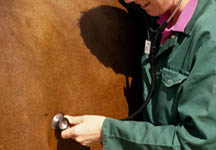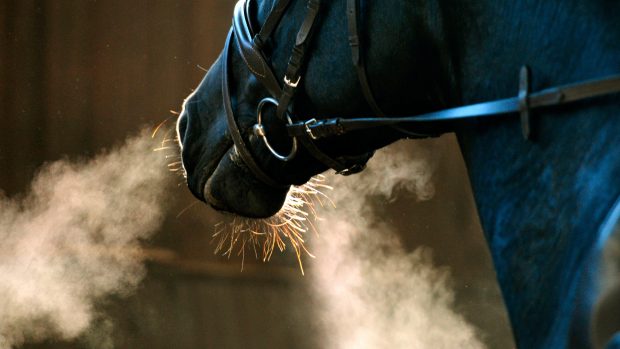Research scientists have found two new non-invasive ways of testing for respiratory problems.
The simple assessment methods include a cough monitor and a device that tests the pH of exhaled breath.
Previously, endoscopy — a tube that goes up the horse’s nose, down the throat and looks into its airways — was the main method available and this can be difficult to administer and uncomfortable for the horse.
But with the new techniques, vets will be able to diagnose respiratory disorders quickly and monitor the progress of treatments.
Respiratory airway inflammation affects from 10 to 50% of horses and can impede performance for competition horses.
The benefit of the new techniques over methods such as endoscopy is that they can be used repeatedly — both for diagnosis and monitoring — to assess whether treatments are effective, without causing discomfort to the horse.
H&H vet Karen Coumbe said: “A clinical examination [observing a horse] doesn’t tell you everything you need to know for respiratory conditions so an endoscopy can be very informative.”
“However it is invasive and not something you would want to do every day, so any research that fills the gap between a non-invasive examination and endoscopy would be great.”
The cough monitor involves attaching a digital recorder to the horse’s headcollar, which will record the number of times the horse coughs over a set period of time.
This data can then be analysed as cough frequency is believed to be a reliable indicator of respiratory inflammation.
The second technique involves attaching a device to the horse’s head that will collect samples of its exhaled breath.
Vets measured the pH of the breath condensation and noticed that horses affected by respiratory inflammation have a higher pH.
The research, which was funded by the charity The Horse Trust, was led by Sandy Love, Professor of Equine Clinical Studies at the University of Glasgow.
“Both of these techniques could be easily commercialised to enable vets to quickly and ethically monitor respiratory inflammation in horses,’ he said.
“They could also improve treatment of respiratory conditions as vets will be able to objectively assess which treatments work for a particular horse.”
The Horse Trust chief executive and veterinary director, Paul Jepson said: “We are delighted that the research we have funded has led to new, non-invasive ways of monitoring respiratory inflammation.”
“These techniques could have a major impact on improving the diagnosis and treatment of this common condition.”



